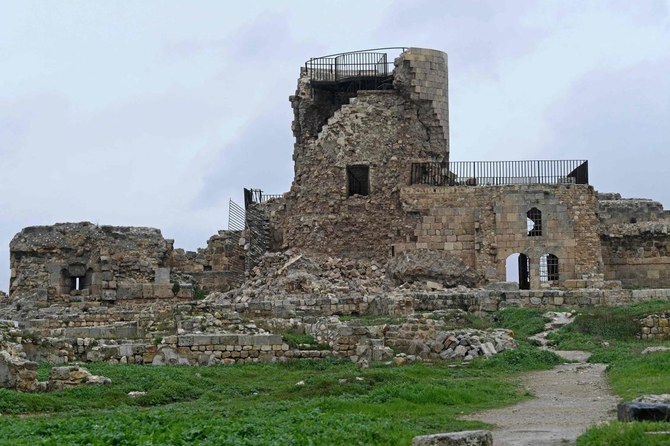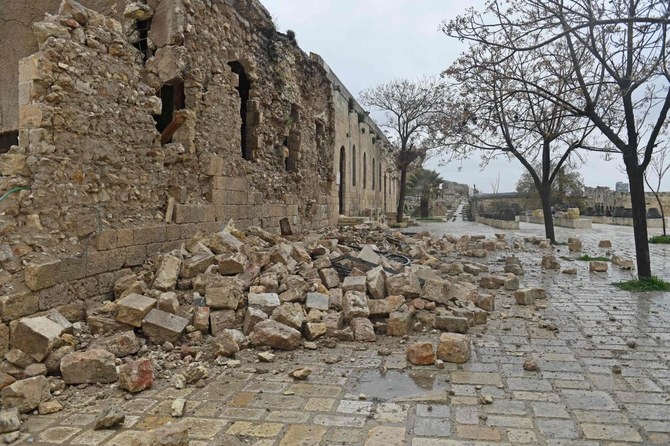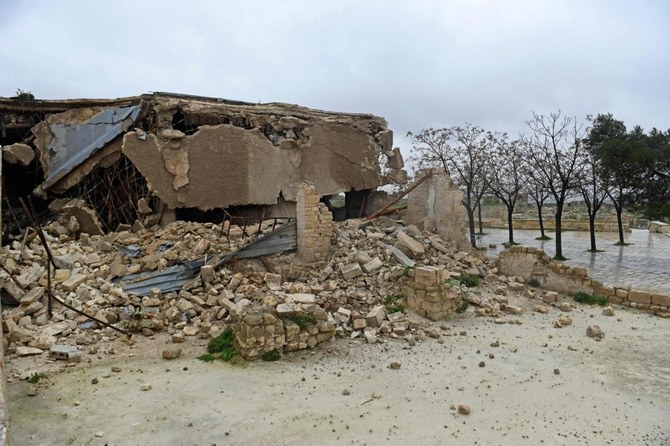DAMASCUS: Several of Syria’s archaeological sites including a famed citadel in the northern city of Aleppo were damaged in a deadly pre-dawn earthquake Monday, the country’s antiquities authority said.
“Parts of the Ottoman mill inside the citadel” of Aleppo have collapsed, while “sections of the northeastern defensive walls have cracked and fallen,” Syria’s Directorate-General of Antiquities and Museums said in a statement.
Parts of the dome of the minaret of the Ayyubid mosque inside the citadel fell off, while the entrance to the fort has been damaged, “including the entrance to the Mamluk tower,” it added, publishing photos of the site on its Facebook page.
More than 1,000 people were killed across Syria as buildings collapsed after the 7.8 magnitude earthquake struck neighboring Turkiye, state media and rescuers said.
At least 156 people died in Aleppo province alone and 507 were injured when 46 buildings collapsed, the official news agency SANA had said, quoting an official.
The city of Aleppo is renowned for its ancient citadel, its UNESCO-listed historic center and its centuries-old covered markets.
Aleppo was Syria’s pre-war commercial hub and considered one of the world’s longest continuously inhabited cities, boasting markets, mosques, caravanserais, and public baths, but a brutal siege imposed on rebels left it disfigured.
Even before the earthquake, buildings in Aleppo often collapsed due to poor infrastructure after more than a decade of war and little oversight to ensure the safety of new construction projects.
In Hama province, archaeological surveys found that “some buildings inside the ancient Al-Marqab Castle” in the city of Baniyas had been damaged, while parts of the fortifications and a tower had fallen, the antiquities body said.
In Tartus province, part of a rocky cliff fell in the vicinity of the Qadmus castle, and residential buildings on the site collapsed, it added.
Expert teams were reportedly assessing the damage, and whether the earthquake had affected the ancient city of Palmyra.
The pre-dawn quake hit near Gaziantep in southeastern Turkiye at a depth of about 18 kilometers (11 miles), the US Geological Survey said.
Tremors were also felt in Lebanon and Cyprus, AFP correspondents said.
Quake damages ancient citadel in Syria’s Aleppo
https://arab.news/9qpc8
Quake damages ancient citadel in Syria’s Aleppo

- “Parts of the Ottoman mill inside the citadel” of Aleppo have collapsed, Syria’s Directorate-General of Antiquities and Museums said
Syria sends thousands of troops to Lebanon border, sources say

- The Syrian officers said the Syrian reinforcement operation began in February but sped up in recent days
- The reinforcements include infantry units, armored vehicles and short-range Grad and Katyusha rocket launchers
DAMASCUS/BEIRUT: Syria has reinforced its border with Lebanon with rocket units and thousands of troops, eight Syrian and Lebanese sources said on Tuesday, as conflict spread in the region including between Israel and Hezbollah in Lebanon.
The sources included five Syrian military officers, a Syrian security official and two Lebanese security officials who spoke on condition of anonymity.
The Syrian officers said the Syrian reinforcement operation began in February but sped up in recent days. The Syrian and Lebanese armed forces did not immediately respond to requests for comment.
The Syrian officers, including a senior member of the military, said the move was aimed at preventing arms and drugs smuggling as well blocking Iran-backed Lebanese Hezbollah or other militants from infiltrating Syria.
A Syrian officer told Reuters that military formations from several Syrian army divisions, including the 52nd and 84th Divisions, have expanded their presence along the border in western Homs countryside and south of Tartus.
The reinforcements include infantry units, armored vehicles and short-range Grad and Katyusha rocket launchers, the official said.
The Syrian security official said Damascus had no plans for military action against any neighboring country. “But Syria is prepared to deal with any security threat to itself or its partners,” he said.
Still, the move has fueled concern among some European and Lebanese officials over a possible incursion.
The Syrian military officers vehemently denied any such plans, saying Syria wants balanced relations with its neighbor after decades of strained ties linked to Syria’s outsized influence in Lebanon and Hezbollah’s support for the former government of Syrian President Bashar Assad during a 14-year civil war.
Syria had troops stationed in Lebanon from 1976 until 2005 including during Lebanon’s civil war that ended in 1990.
Hezbollah resumed firing at Israel on Monday more than a year after reaching a ceasefire to a months-long war in 2024. Since that ceasefire, Israel continued near-daily strikes.
Israel this week ordered much of Lebanon’s south evacuated, with tens of thousands of people displaced. Israeli airstrikes across Lebanon’s South and southern Beirut have killed dozens and prompted thousands of people to flee toward Syria.
A senior Lebanese security official said Syrian authorities told Beirut that Syria’s deployment of rocket launchers along the mountains that form Lebanon’s eastern border with Syria was a “defensive measure against any action or attack that Hezbollah might launch against Syria.”
















